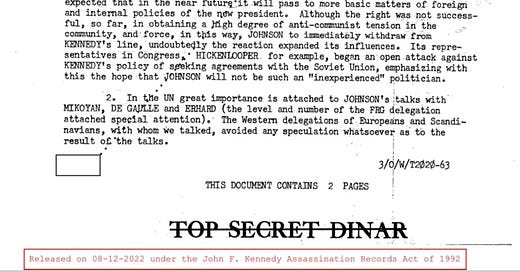EXCLUSIVE: NSA Keeps Hiding its Secrets About the JFK Assassination
This week’s “big reveal” from the National Archives on the assassination of President Kennedy was anything but, yet there are tantalizing hints of deep secrets still to be released to the public
This week, the National Archives and Records Administration released a new tranche of declassified records from the Intelligence Community pertaining to the assassination of President John F. Kennedy in Dallas on November 22, 1963. Acting on the orders of President Joe Biden, who issued a relevant executive order in October of this year, NARA placed 1,491 documents online. Although this release had been hyped-up as a “big reveal,” it falls short of expectations. There are no “bombshells” here. Further, this release represents only one-tenth of the 15,000 documents that are supposed to be released to the public about JFK’s assassination.
There are no “smoking guns,” yet there’s plenty that’s of interest to assassination and spy buffs alike. We learned a bit more about how CIA had Lee Harvey Oswald under surveillance when he visited Mexico City a few weeks before the assassination, including his interacting there with a KGB officer from that service’s wetwork (i.e. assassination) department. Tantalizing stuff, to be sure, but there’s no big reveal in this.
Moreover, the surprise expressed in certain quarters that CIA was interested in Oswald reflects immaturity: of course, the agency wanted to know what Oswald was up to. He was a former U.S. Marine with knowledge of CIA’s highly classified U-2 spy plane who defected to the Soviet Union, then returned home, fell in with Communists, and wanted to redefect (Oswald’s last, forlorn hope was finding sanctuary in Castro’s Cuba). In 1963, just months after the Cuban Missile Crisis, there was ample reason for Langley to wonder what Oswald was doing, which had nothing to do with his impending awful deed in Dallas.
There’s plenty here to whet the appetite of counterintelligence aficionados, including multiple classified interviews with James Angleton, the legendary head of CIA’s Counterintelligence Staff, as well as an interview with his longtime deputy and factotum Ray Rocca. These are important sources for historians as well as assassination gurus, given Angleton’s shadowy role in Washington, DC, over decades, but they offer little that’s new in terms of what happened in Dallas. That said, the Angleton and Rocca accounts make painfully clear that American counterintelligence was in a bad way at the height of the Cold War, and that shortcoming formed part of the backstory to JFK’s assassination.
Keep reading with a 7-day free trial
Subscribe to TOP SECRET UMBRA to keep reading this post and get 7 days of free access to the full post archives.



